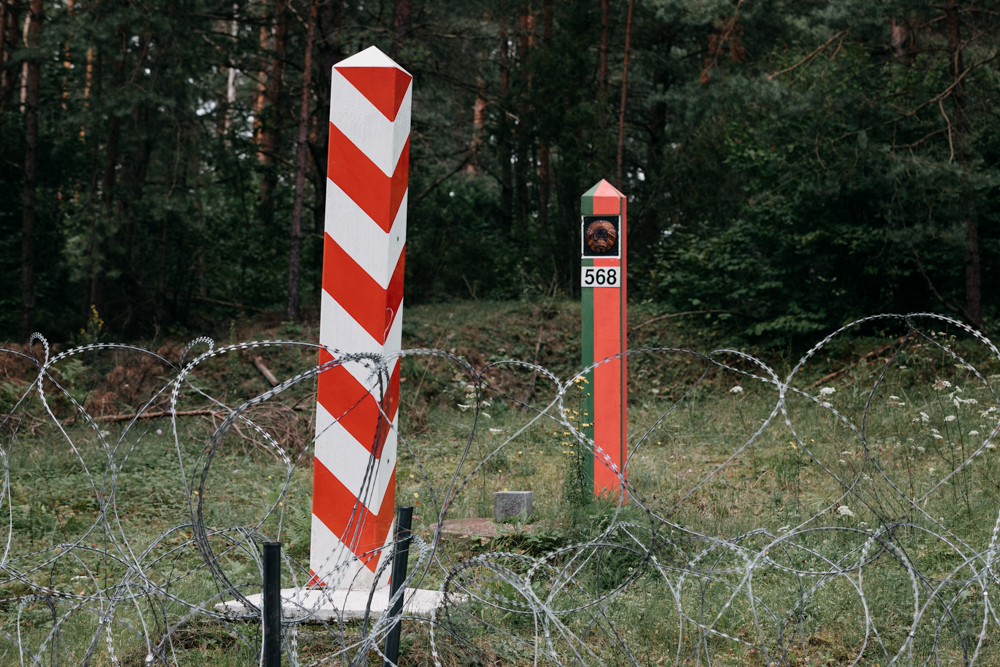Poland’s government says that its tough policies on the border with Belarus, where it has introduced a state of emergency and is pushing back migrants, have the support of the European Union.
The European Commission has, however, warned Warsaw that it must comply with EU law, and has urged it to work with the EU’s border agency, Frontex. Germany has also called for a “humane” and lawful approach to be taken at the border.
Poland has extended the state of emergency on its border with Belarus amid a surge in crossings.
The decision was approved by parliament amid angry scenes, with opposition MPs criticising the government for sending child migrants back over the border https://t.co/vqfiFkt3DJ
— Notes from Poland 🇵🇱 (@notesfrompoland) October 1, 2021
“The EU and member states understand that Poland is effectively guarding the Polish-Belarusian border; our neighbours support us in these efforts,” said deputy foreign minister Szymon Szynkowski vel Sęk. “Our partners understand the situation, they understand that the migration pressure is very strong.”
“Fortunately, we do not have to ask our partners for help, but they are ready to provide such help if it is needed,” he added, quoted by the Polish Press Agency (PAP). “For now we are coping with our own forces and resources.”
On Thursday, the EU’s commissioner for home affairs, Ylva Johansson, met with Poland’s interior minister, Mariusz Kamiński, to discuss the situation.
Ahead of the meeting, Johansson said that, while “we must act decisively towards [Belarusian President Alexander] Lukashenko, we must also show that this is a European border, not just a Polish one”. That means “transparency is important, and we must act in accordance with EU rules and European values”.
2/3
…The EU is ready to assist.
The response to Belarusian provocations at our shared external border must be unified.
Shared border means shared EU resources based on shared values.
This is the self-confident, democratic response…— Ylva Johansson (@YlvaJohansson) September 30, 2021
Critics have accused Poland of violating international law by pushing asylum seekers back over the border into Belarus. They have also argued that the state of emergency – which bans media and NGOs from the border area – is designed to hide the actions of the army and border guards there.
Johansson noted that the recent deaths of at least five border crossers on Polish territory is “a source of concern”, reports Interia. “We must not allow people on the EU border to die,” she added, while thanking Kamiński for his assurances that Polish prosecutors will investigate the deaths.
“During the meeting, I emphasized that Poland grants international protection to people whose life and health are at risk, as exemplified by the assistance provided to Belarusians persecuted by the Lukashenko regime and the evacuation of around 1,300 refugees from Afghanistan,” said Kamiński.
Last week the European Commission publicly appealed for Poland to allow Frontex to provide assistance at the border. But the government has so far not requested or authorised this.
Asked about the issue this week, Kamiński said that the Polish authorities had “constant contact” and “very good cooperation” with Frontex, including “exchanging information and opinions on a daily basis”, reports PAP. He claimed that suggestions of a lack of cooperation were “an artificial problem”.
PAP, which is Poland’s state press agency, also reports from inside sources that the European Commission has expressed support for Poland’s actions at the border. However, some international media – including Politico Europe and the Guardian – say that there is growing concern in Brussels over the treatment of migrants there.
On Friday, Angela Merkel’s spokesman said that, while Belarus’s “instrumentalisation of migrants is totally unacceptable[,]…at the same time effective border protection must always uphold humanitarianism and applicable law”. Berlin called for “humane solutions” and “urgent support” for people at the border.
Around 20-30% of people detained by Poland’s border guard and returned into Belarus are children, reports Dziennik Gazeta Prawna. That included a group of Iraqis and Turkish Kurds pushed back this week.
Poland’s deputy commission for human rights, Hanna Machińska, described the latter case as a “scandal” that shows the “darkest possible image of Poland”, reports Gazeta.pl. She also said that such treatment of families and children violated “all the rules”.
The commissioner for children’s rights, Mikołaj Pawlak, has asked the border guard for an explanation, his office told Dziennik Gazeta Prawna. Pawlak expressed concern that such pushbacks threaten the safety of the children involved. Legal experts also say that they violate international law.
Main image credit: Adam Guz/KPRM (under CC BY-NC-ND 2.0)

Daniel Tilles is editor-in-chief of Notes from Poland. He has written on Polish affairs for a wide range of publications, including Foreign Policy, POLITICO Europe, EUobserver and Dziennik Gazeta Prawna.




















